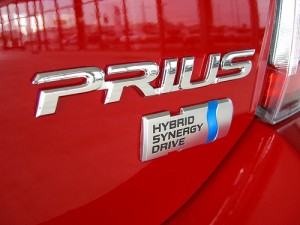Fuel Efficiency Driving Onshoring
 Lost in the current debate about “offshoring” is the remarkable story of the “onshoring” of fuel-efficiency manufacturing. Thanks in large part to stronger standards, American drivers no longer have to buy foreign if they want to trade in their gas guzzler for gas sippers. Fuel-efficiency is driving sales and jobs growth in the auto industry. And as demand grows, so does the business case to make fuel efficient cars and components in America.
Lost in the current debate about “offshoring” is the remarkable story of the “onshoring” of fuel-efficiency manufacturing. Thanks in large part to stronger standards, American drivers no longer have to buy foreign if they want to trade in their gas guzzler for gas sippers. Fuel-efficiency is driving sales and jobs growth in the auto industry. And as demand grows, so does the business case to make fuel efficient cars and components in America.Hybrid productions exemplify this trend. With U.S. hybrid sales booming (up 63% this year), Toyota and Honda are bringing production to the U.S. Most recently, Honda Motor Co. plans to invest $40 million and bring all global Civic Hybrid manufacturing to its Greensburg, Indiana manufacturing plant from Japan, creating 300 jobs by the end of the year.
Earlier this year, Toyota announced it would bring production of its Highlander mid-size SUV, including the Highlander Hybrid, to its Princeton, Indiana plant from its current plant in Japan. The move to expand capacity represents an investment of $400 million and will add another 400 jobs. Furthermore, Toyota plans to begin producing the Prius hybrid in the U.S. by 2015, bringing production inshore from Japan to a yet-to-be specified plant.
With greater hybrid production, comes even more jobs related to building the key components, already Ford Motor Co., the domestic hybrid sales leader, has invested over $135 million into creating a “center of excellence” for electric vehicles in the Detroit area, including moving battery pack assembly to the Rawsonville Plant in Ypsilanti, MI, and electric drive transaxles at the Van Dyke Transmission Plant in Sterling Heights, MI.
In an example of “insourcing” production, or moving production in-house that was previously done by a supplier or contractor, as well as “onshoring,” bringing production back to America from overseas, Ford is shifting battery pack production to Ypsilanti, MI from a Mexican supplier, and the critical transaxle production from a supplier in Japan, creating 170 jobs between the plants.
As noted in the above article, Toyota is already actively seeking domestic suppliers for Prius components. But hybrids and hybrid components are just the start of the story. With standards set to finalized next month which will double today’s efficiency to 54.5 mpg by 2025, automakers will need to make more fuel-efficient vehicles and buy more fuel-efficient components. The high volumes needed to meet stronger standards will dictate that a large proportion of these components will be made in America, including stop/start systems, turbochargers, dual clutch transmissions, high pressure gasoline injectors, and the list goes on.
Onshoring of production of these other fuel efficiency components is already happening. DENSO Manufacturing is hiring 100 Tennessee workers over the next two years to manufacture its stop/start engine starters. Stop/start technology, while new to the U.S. domestic market, has been used for a number of years in the European and Japanese markets to increase fuel efficiency 3-5%. DENSO realized that “As U.S. automakers look to meet the upcoming fuel requirements, consumers will see more vehicles equipped with stop/start technology,” and DENSO, rather than importing the parts from factories overseas, found it more cost-effective to manufacture the starter modules here in the U.S., a prime example of onshoring.
Since June 2009 when the industry hit bottom, the American auto industry has grown 25% and added 150,000 jobs in motor vehicle and parts manufacturing, according to official Bureau of Labor Statistics data, showing that automakers and their suppliers are looking ahead to a brighter future after the dark days of the recession. Part of that brighter future will certainly involve manufacturers investing in innovative technologies to prepare their vehicle fleets for increased fuel efficiency standards, including the 54.5 mpg standard expected to be finalized in mid-August.
What critics miss about the wisdom of setting strong fuel efficiency standards is that manufacturers throughout the auto supply chain gain regulatory certainty that the standards help provide a market for their innovative and efficiency-boosting products. America no longer has to cede fuel-sipping technological manufacturing to the European and Japanese markets, as America becomes both a source and a market for those innovations itself. Regardless of one’s place on the political spectrum, we can all agree that changing the terms of the debate from “out” and “on” is a positive development for our country.
You can return to the main Market News page, or press the Back button on your browser.

